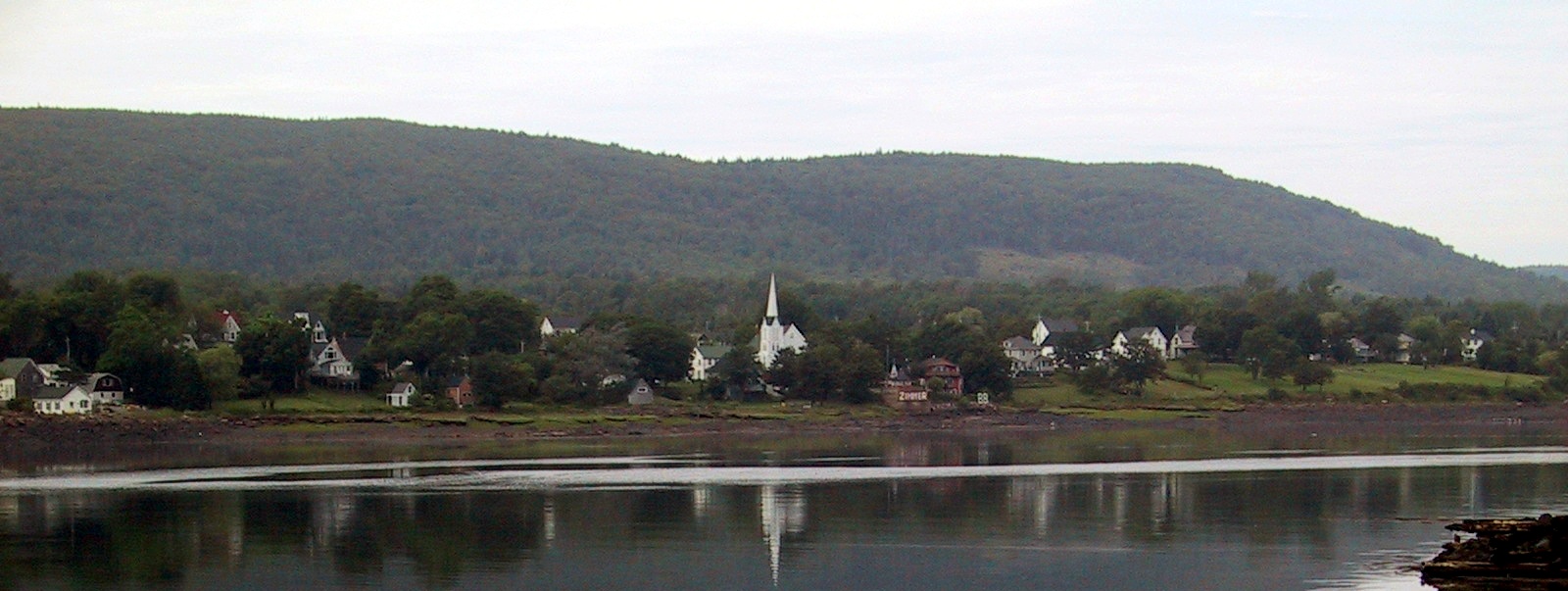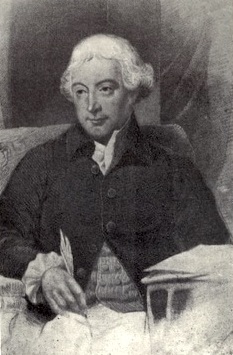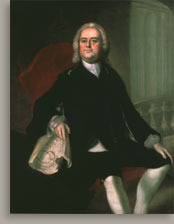|
John Doucett
John Doucett (Doucette) (died November 19, 1726) was probably of French descent although he did not speak the language and was likely born in England. He was a career military man and, from 1702 on, received several promotions. He was appointed lieutenant-governor of Annapolis Royal in May, 1717 and arrived in Nova Scotia in October. He was also acting on behalf of Richard Philipps, the new governor of Nova Scotia who was still in England. He administered the government there from 1717 to 1720 and was lieutenant-governor of Annapolis Royal, N.S. from 1717 to 1726. He was active and visible in both capacities, working to improve relations between the British and French colonists, to minimize smuggling and fisheries encroachment, and to secure a lasting peace between the various Indian chiefs and the government. He had some noteworthy successes, particularly securing a ratified peace with the First Nations at the close of Dummer's War Dummer's War (1722–1725) is also known as ... [...More Info...] [...Related Items...] OR: [Wikipedia] [Google] [Baidu] |
Annapolis Royal
Annapolis Royal, formerly known as Port-Royal (Acadia), Port Royal, is a town located in the western part of Annapolis County, Nova Scotia, Canada. Today's Annapolis Royal is the second French settlement known by the same name and should not be confused with the nearby 1605 French settlement at the Port-Royal National Historic Site also known as the Habitation. In 1629 Scottish settlers established Charles Fort at a new location, but it was ceded to France in 1632 and became the second Port-Royal. This newer French settlement was renamed in honour of Anne, Queen of Great Britain, Queen Anne following the Siege of Port Royal (1710), siege of Port Royal in 1710 by Kingdom of Great Britain, Britain. The town was the capital of Acadia and later Nova Scotia for almost 150 years, until the founding of City of Halifax, Halifax in 1749. It was attacked by the British six times before permanently changing hands after the siege of Port Royal in 1710. Over the next fifty years, the French ... [...More Info...] [...Related Items...] OR: [Wikipedia] [Google] [Baidu] |
Nova Scotia
Nova Scotia ( ; ; ) is one of the thirteen provinces and territories of Canada. It is one of the three Maritime provinces and one of the four Atlantic provinces. Nova Scotia is Latin for "New Scotland". Most of the population are native English-speakers, and the province's population is 969,383 according to the 2021 Census. It is the most populous of Canada's Atlantic provinces. It is the country's second-most densely populated province and second-smallest province by area, both after Prince Edward Island. Its area of includes Cape Breton Island and 3,800 other coastal islands. The Nova Scotia peninsula is connected to the rest of North America by the Isthmus of Chignecto, on which the province's land border with New Brunswick is located. The province borders the Bay of Fundy and Gulf of Maine to the west and the Atlantic Ocean to the south and east, and is separated from Prince Edward Island and the island of Newfoundland by the Northumberland and Cabot straits, ... [...More Info...] [...Related Items...] OR: [Wikipedia] [Google] [Baidu] |
Richard Philipps
General Richard Philipps (1661 – 14 October 1750) was said to have been in the employ of William III as a young man and for his service gained the rank of captain in the British army. He served at the Battle of the Boyne in 1690 and promoted to Lieutenant Colonel in 1712. He raised the 40th Regiment of Foot in August 1717. In 1717 he was appointed Governor of Nova Scotia by George I. He arrived in Annapolis Royal in 1720, created the Nova Scotia Council and in 1722 returned to England. He made another visit to Nova Scotia and persuaded the Acadian French to swear allegiance to the British Government. He returned again to England about 1731. During the early years he evidently was an active and responsible governor. After 1731 his interest in the province was much reduced. Because of absences and laterally, waning interest, the roles of those acting for the Governor were greatly enhanced. They were: John Doucett, (1717–1725); Lawrence Armstrong, (1725–1739); Alexander C ... [...More Info...] [...Related Items...] OR: [Wikipedia] [Google] [Baidu] |
Lieutenant Governors Of Nova Scotia
The following is a list of the governors and lieutenant governors of Nova Scotia. Though the present day office of the lieutenant governor in Nova Scotia came into being only upon the province's entry into Canadian Confederation in 1867, the post is a continuation from the first governorship of Nova Scotia in 1710. For much of the time, the full title of the post was Governor of Nova Scotia and Placentia (Placentia being in Newfoundland). Before the British occupation of Nova Scotia, the province was governed by French Governors of Acadia. From 1784 to 1829 Cape Breton Island was a separate colony with a vice regal post. Governors of Nova Scotia, 1710–1786 Lieutenant governors of Cape Breton Island, 1784–1820 Lieutenant governors of Nova Scotia, 1786–1867 Lieutenant governors of Nova Scotia, 1867–present See also * Office-holders of Canada * Canadian incumbents by year External links * * References {{Nova Scotia politics * Nova Scotia Nova Sc ... [...More Info...] [...Related Items...] OR: [Wikipedia] [Google] [Baidu] |
Dummer's War
Dummer's War (1722–1725) is also known as Father Rale's War, Lovewell's War, Greylock's War, the Three Years War, the Wabanaki-New England War, or the Fourth Anglo-Abenaki War. It was a series of battles between the New England Colonies and the Wabanaki Confederacy (specifically the Miꞌkmaq, Maliseet, Penobscot, and Abenaki), who were allied with New France. The eastern theater of the war was located primarily along the border between New England and Acadia in Maine, as well as in Nova Scotia; the western theater was located in northern Massachusetts and Vermont at the border between Canada (New France) and New England. During this time, Maine and Vermont were part of Massachusetts.The Nova Scotia theater of the Dummer War is named the "Mi'kmaq-Maliseet War". John Grenier. ''The Far Reaches of Empire: War in Nova Scotia 1710-1760''. University of Oklahoma Press. 2008. The root cause of the conflict on the Maine frontier concerned the border between Acadia and New England, wh ... [...More Info...] [...Related Items...] OR: [Wikipedia] [Google] [Baidu] |
Thomas Caulfeild
Thomas Caulfeild (often also spelled Caulfield, baptized 26 March 1685 – 2 March 1716/7) was an early British Lieutenant-Governor of Nova Scotia. Due to the frequent absence of governors Samuel Vetch and Francis Nicholson, Caulfeild often acted as governor for extended periods between 1711 and his death. Caulfeild was born to an English family in Ireland. He was the younger son of William Caulfeild, 2nd Viscount Charlemont and the daughter of the Archbishop of Armagh. He entered the military, serving in Spain during the early years of the War of the Spanish Succession. In 1710, his regiment was sent to North America, where he took part in Francis Nicholson's successful expedition against Port-Royal, the capital of French Acadia. The next year he served in Admiral Hovenden Walker's disastrous expedition to Quebec. He impressed General John Hill, the commander of the expedition's land forces, and was appointed by Hill to command the garrison at Annapolis Royal (as ... [...More Info...] [...Related Items...] OR: [Wikipedia] [Google] [Baidu] |
List Of Lieutenant Governors Of Nova Scotia
The following is a list of the governors and lieutenant governors of Nova Scotia. Though the present day office of the lieutenant governor in Nova Scotia came into being only upon the province's entry into Canadian Confederation in 1867, the post is a continuation from the first governorship of Nova Scotia in 1710. For much of the time, the full title of the post was Governor of Nova Scotia and Placentia (Placentia being in Newfoundland). Before the British occupation of Nova Scotia, the province was governed by French Governors of Acadia. From 1784 to 1829 Cape Breton Island was a separate colony with a vice regal post. Governors of Nova Scotia, 1710–1786 Lieutenant governors of Cape Breton Island, 1784–1820 Lieutenant governors of Nova Scotia, 1786–1867 Lieutenant governors of Nova Scotia, 1867–present See also * Office-holders of Canada * Canadian incumbents by year External links * * References {{Nova Scotia politics * Nova Scotia Nova Scot ... [...More Info...] [...Related Items...] OR: [Wikipedia] [Google] [Baidu] |
Lawrence Armstrong
Lawrence Armstrong (1664 – 6 December 1739) was a lieutenant-governor of Nova Scotia and acted as a replacement for the governor, Richard Philipps, during his long absences from the colony. Armstrong was born in 1664 in Ireland. According to a Pedigree of Armstrongs compiled by Edmund Clarence Richard Armstrong, Bluemantle Pursuivant, Keeper of Irish Antiquities, National Museum, Dublin, His parents were Charles Armstrong (1646-1731) and a Miss Gostwick, who are shown in Burke's Commoners as having no issue. Charles Armstrong's birthplace was Stonestown, Offaly, Ireland. Armstrong arrived in the New World in 1711 as a ship-wreck victim along with troops headed to take Quebec. He and a contingent of men were dispatched to strengthen Annapolis Royal Annapolis Royal, formerly known as Port Royal, is a town located in the western part of Annapolis County, Nova Scotia, Canada. Today's Annapolis Royal is the second French settlement known by the same name and should not be ... [...More Info...] [...Related Items...] OR: [Wikipedia] [Google] [Baidu] |
1726 Deaths
Seventeen or 17 may refer to: *17 (number), the natural number following 16 and preceding 18 * one of the years 17 BC, AD 17, 1917, 2017 Literature Magazines *Seventeen (American magazine), ''Seventeen'' (American magazine), an American magazine *Seventeen (Japanese magazine), ''Seventeen'' (Japanese magazine), a Japanese magazine Novels *Seventeen (Tarkington novel), ''Seventeen'' (Tarkington novel), a 1916 novel by Booth Tarkington *''Seventeen'' (''Sebuntiin''), a 1961 novel by Kenzaburō Ōe *Seventeen (Serafin novel), ''Seventeen'' (Serafin novel), a 2004 novel by Shan Serafin Stage and screen Film *Seventeen (1916 film), ''Seventeen'' (1916 film), an American silent comedy film *''Number Seventeen'', a 1932 film directed by Alfred Hitchcock *Seventeen (1940 film), ''Seventeen'' (1940 film), an American comedy film *''Eric Soya's '17''' (Danish: ''Sytten''), a 1965 Danish comedy film *Seventeen (1985 film), ''Seventeen'' (1985 film), a documentary film *17 Again (film), ... [...More Info...] [...Related Items...] OR: [Wikipedia] [Google] [Baidu] |
Governors Of The Colony Of Nova Scotia
A governor is an administrative leader and head of a polity or political region, ranking under the head of state and in some cases, such as governors-general, as the head of state's official representative. Depending on the type of political region or polity, a ''governor'' may be either appointed or elected, and the governor's powers can vary significantly, depending on the public laws in place locally. The adjective pertaining to a governor is gubernatorial, from the Latin root ''gubernare''. Ancient empires Pre-Roman empires Though the legal and administrative framework of provinces, each administrated by a governor, was created by the Romans, the term ''governor'' has been a convenient term for historians to describe similar systems in antiquity. Indeed, many regions of the pre-Roman antiquity were ultimately replaced by Roman 'standardized' provincial governments after their conquest by Rome. Plato used the metaphor of turning the Ship of State with a rudder; the Latin w ... [...More Info...] [...Related Items...] OR: [Wikipedia] [Google] [Baidu] |
Year Of Birth Unknown
A year or annus is the orbital period of a planetary body, for example, the Earth, moving in its orbit around the Sun. Due to the Earth's axial tilt, the course of a year sees the passing of the seasons, marked by change in weather, the hours of daylight, and, consequently, vegetation and soil fertility. In temperate and subpolar climate, subpolar regions around the planet, four seasons are generally recognized: spring (season), spring, summer, autumn and winter. In tropics, tropical and subtropics, subtropical regions, several geographical sectors do not present defined seasons; but in the tropics#Seasons and climate, seasonal tropics, the annual wet season, wet and dry seasons are recognized and tracked. A calendar year is an approximation of the number of days of the Earth's orbital period, as counted in a given calendar. The Gregorian calendar, or modern calendar, presents its calendar year to be either a common year of 365 days or a leap year of 366 days, as do t ... [...More Info...] [...Related Items...] OR: [Wikipedia] [Google] [Baidu] |
People In Father Rale's War
A person ( : people) is a being that has certain capacities or attributes such as reason, morality, consciousness or self-consciousness, and being a part of a culturally established form of social relations such as kinship, ownership of property, or legal responsibility. The defining features of personhood and, consequently, what makes a person count as a person, differ widely among cultures and contexts. In addition to the question of personhood, of what makes a being count as a person to begin with, there are further questions about personal identity and self: both about what makes any particular person that particular person instead of another, and about what makes a person at one time the same person as they were or will be at another time despite any intervening changes. The plural form "people" is often used to refer to an entire nation or ethnic group (as in "a people"), and this was the original meaning of the word; it subsequently acquired its use as a plural form of ... [...More Info...] [...Related Items...] OR: [Wikipedia] [Google] [Baidu] |





_1938.jpg)